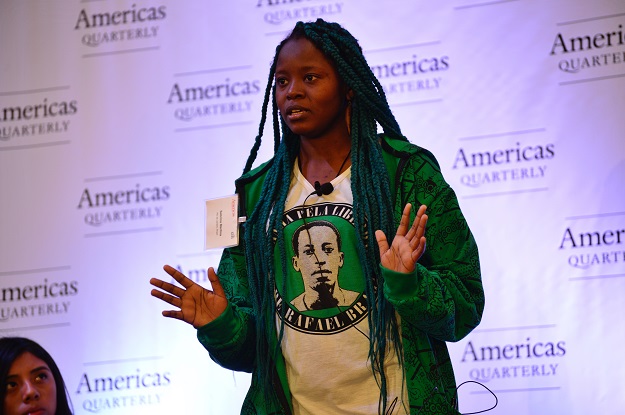Sabrina, 19, steps off the stage and walks confidently into the crowd. Her blue braids sway back and forth as she moves through the audience and performs spoken-word poetry about her life in Rio de Janeiro’s Complexo de Alemão favela.
“Though I love poetry and rhythm, I still dream of being the first university graduate in my family,” she recites.
“Against traffic I go, through the neighborhoods of my favela, fighting society’s injustices. Through art, we resist, we insist, we exist.”
Sabrina’s spoken word poetry starts at 1:20
Sabrina’s poetry, which she delivered in Lima on Aug. 2 for the launch of AQ’s new issue on Latin American youth, speaks to the challenges facing young people in Rio’s largest favela. In an interview after the performance, Sabrina said she sees more peers from Alemão going to college, but that black Brazilians like her still face frequent police harassment and discrimination.
These kinds of contradictions aren’t unique to Rio de Janeiro or Brazil. In 2017, being young in Latin America often means growing up with ever loftier ambitions, even as basics like a quality education or a decent job remain out of reach.
“Young people see development happening around them and infrastructure being built, and they have a sense of optimism that things are getting better,” Brandee McHale, president of the Citi Foundation, told AQ’s editor-in-chief Brian Winter in a panel discussion during the event. “But they also see challenges and that the world is getting more complicated.”
As part of the event, AQ asked McHale and a panel of entrepreneurs, executives and civil servants to identify strategies for how governments and businesses can help young people meet high expectations in a region where an economic slowdown and political scandals have produced a growing sense of uncertainty.
For Peru’s Vice President Mercedes Aráoz, who delivered the keynote address, this meant pursuing ambitious but “realistic” solutions, like passing legislation that would subsidize apprenticeships – an educational tool that young Latin Americans are increasingly drawn to, according to McHale.
Businesses, meanwhile, would be wise to look for talent outside traditional sources, like elite universities, said Carlos Montalván, the corporate talent manager at Grupo Intercorp in Lima. When hiring young people, Montalván said he looks for “resilience, curiosity, and the ability to connect with other people” – values panelists agreed were increasingly vital as the nature of work rapidly evolves.
“Companies can generate loyalty by investing in young people who have faced challenges and can be role models,” McHale added, noting the success of Laboratoria, a nonprofit organization that trains young women from poor communities in Peru in computer coding.
Sabrina, meanwhile, is proof that the region has plenty of young role models ready to take on the challenges of the future, even if the road ahead is daunting.
“The number one worry in the favela is just surviving,” Sabrina said. “But I want to go to university. I’m trying. It’s difficult, but I won’t give up.”
—
O’Boyle is an editor for AQ









